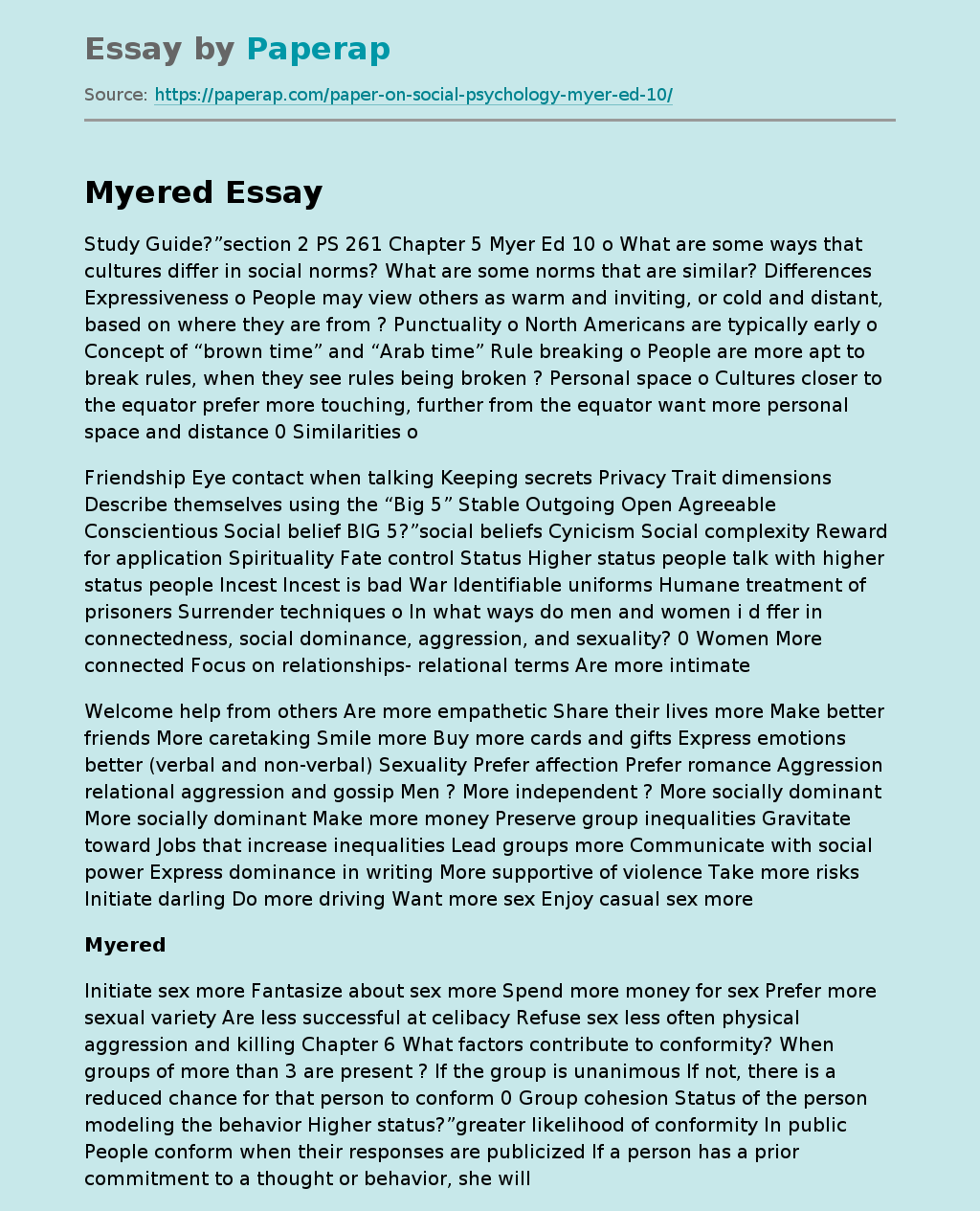Cultural Norms: Differences and Similarities
Study Guide?”section 2 PS 261 Chapter 5 Myer Ed 10 o What are some ways that cultures differ in social norms? What are some norms that are similar? Differences Expressiveness o People may view others as warm and inviting, or cold and distant, based on where they are from ? Punctuality o North Americans are typically early o Concept of “brown time” and “Arab time” Rule breaking o People are more apt to break rules, when they see rules being broken ? Personal space o Cultures closer to the equator prefer more touching, further from the equator want more personal space and distance 0 Similarities o
Friendship Eye contact when talking Keeping secrets Privacy Trait dimensions Describe themselves using the “Big 5” Stable Outgoing Open Agreeable Conscientious Social belief BIG 5?”social beliefs Cynicism Social complexity Reward for application Spirituality Fate control Status Higher status people talk with higher status people Incest Incest is bad War Identifiable uniforms Humane treatment of prisoners Surrender techniques o In what ways do men and women i d ffer in connectedness, social dominance, aggression, and sexuality? 0 Women More connected Focus on relationships- relational terms Are more intimate
Welcome help from others Are more empathetic Share their lives more Make better friends More caretaking Smile more Buy more cards and gifts Express emotions better (verbal and non-verbal) Sexuality Prefer affection Prefer romance Aggression relational aggression and gossip Men ? More independent ? More socially dominant More socially dominant Make more money Preserve group inequalities Gravitate toward Jobs that increase inequalities Lead groups more Communicate with social power Express dominance in writing More supportive of violence Take more risks Initiate darling Do more driving Want more sex Enjoy casual sex more
Myered
Initiate sex more Fantasize about sex more Spend more money for sex Prefer more sexual variety Are less successful at celibacy Refuse sex less often physical aggression and killing Chapter 6 What factors contribute to conformity? When groups of more than 3 are present ? If the group is unanimous If not, there is a reduced chance for that person to conform 0 Group cohesion Status of the person modeling the behavior Higher status?”greater likelihood of conformity In public People conform when their responses are publicized If a person has a prior commitment to a thought or behavior, she will not conform
What factors contribute to obedience? Victim’s distance If you cannot see the victim, you will have less of a connection with them, and are more apt to be obedient 0 Closeness and legitimacy of authority The bigger the authority, and the more legit he is, the more you obey ? If the authority fgure is there, you obey 0 Institutional authority ? If the place you are at is a big named place, you are more likely to obey the officials there Chapter 7 o When will an audience be persuaded via the central route?
The peripheral route? 0 Central ? Interested people focus on the subject and respond to that argument oFavorably f it’s strong o Countering if it’s weak 0 Peripheral (faster) ? Incidental cues o Attractiveness of the speaker, product, etc. Heuristics o Quick Judgments o Elements of persuasion, and how does each attitude/behavior change via the central and peripheral route?
Elements (communication, message, channel of communication, and audience) OCentral route Communicator Credible Knowledgeable Trustworthy Message route Rational arguments Large discrepancy (credible) Two-sided arguments (disagree) Channel of communication Written (complex messages) Audience Motivated and Able Unhappy High need for cognition Peripheral
Non-credible (sleeper effect) Appears to be an expert Speaks confidently Attractive Similar (values and way of life) Message Positive messages A large amount of information One-sided arguments Channel Audio or Video (easier messages) Passive Reception (clich?©s) Positive mood Unconcerned – unmotivated / uninvolved Distracted Two sided issues Primacy First message seems more persuasive Recency If there is a gap between arguments, then second message is more persuasive, however o Complexity 0 More: face to face, print 0 Less: mass media Chapter 8 o What is social facilitation, and why does it occur in front of other?
The tendency for people to perform simple or well learned complex tasks in front of others 0 Strengthening dominant responses in the presence of others Arousal facilitates dominant responses, and easy tasks are dominant. ? Evaluation apprehension Factors that contribute to social loafing Groups size Lack of individual identity Evaluation apprehension Factors that contribute to group polarization Discussion Comparison with others Social comparison Pluralistic ignorance Groups of like-minded people Factors that contribute to group think group cohesiveness structural faults ? insulation of the group ? lack of impartial leadership ? lack of norms requiring methodological procedures ? homogeneity of members’ social backgrounds and ideology situational context When does the minority influence the majority?
Minorities that speak up can increase the majority’s doubts and prompt it to consider more alternatives ? Leads to better and more creative decisions 0 Consistent and persistent in views Self confidence Ability to attract defections from the majority Task and social leadership o Press towards goals and exude self-confidence can gain trust and inspire others to follow
Cultural Norms: Differences and Similarities. (2019, Dec 05). Retrieved from https://paperap.com/paper-on-social-psychology-myer-ed-10/
